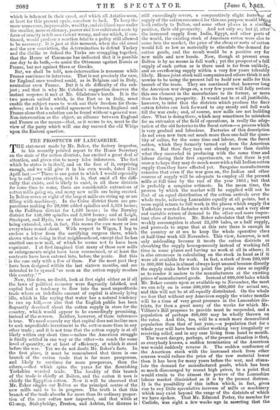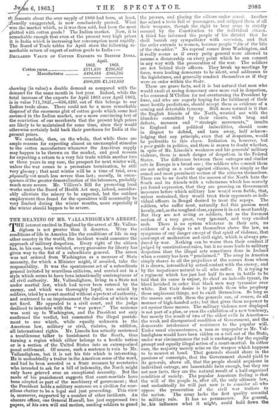THE PROSPECTS OF LANCASHIRE. T HE statement made by Mr. Baker,
the factory inspector, in his recently printed report to the Home Secretary on the state of the cotton districts, has excited a great deal of attention, and given rise to many false inferences. The fact • which he states is in itself, and on the face of it, surprising enough, and we will give it in his own words, dated 22nd April last :—" There is one point to which I would especially beg to call your attention, and it is, that amid all the diffi- culty that exists, and is likely to exist, in all these districts for some time to come, there are considerable extensions of cotton mills going on, and many new mills are being erected. In Bolton seven or eight of the largest mills are rising up or are filling with machinery. In the Colne district there are pre- parations making for 20,000 added spindles and 5,325 looms; in the Padiham district for 1,450 looms ; in the Burnley district for 150,500 spindles and 3,600 looms • and at Leigh, Stockport, and Hyde, two or three large mils are built and being extended, and, in fact, this seems the case more or less everywhere round about. With respect to Wigan, I beg to enclose a letter from the certifying surgeon there, which shows what is doing in that neighbourhood, except that he has omitted one new mill, of which he seems not to have been cognizant. I at first imagined that many of these new mills or enlargements might have been commenced, or at least the contracts have been entered into, before the panic. But this is the case only with a few of them. For the most part they have been designed within the last sixteen months and are intended to be opened as soon as the cotton supply reaches this country.' " • Now, this does, no doubt, look at first sight either as if all the laws of political ecenomy were flagrantly falsified, and capital had a tendency to flow into the most unprofitable trade where an indefinite amount of capital is already lying • idle, which is like saying that water has a natural tendency to run up hill,—or else that the English public has been flagrantly deceived about the cotton supply in store for the country, which would appear to be exceedingly promising, instead of the reverse. Neither, however, of these inferences is true. We need scarcely say that capital does not incline men to seek unprofitable investment in the cotton more than in any other trade ; and it is not true that the cotton supply is at all likely within any short time—unless the American struggle is finally settled in one way or the other—to reach the same level of quantity, or at least of efficiency, at which it stood before the war. Yet we do not doubt Mr. Baker's facts. In ' the first place, it must be remembered that there is one branch of the cotton trade that is far more prosperous, and likely to continue far more prosperous, than the others,—that which spins the yarns for the flourishing Yorkshire worsted trade. The locality of this branch of the trade is chiefly at Bolton, and the cotton it uses is chiefly the Egyptian cotton. Now it will be observed that Mr. Baker singles out Bolton as the principal centre of the hew mills said to be in progress. The truth is that this branch of the trade absorbs far more than its ordinary propor- tion of the raw cotton now imported, and that while at Glossop, Staleybridge, Preston, and Ashton, the distress is still exceedingly severe, a comparatively slight mere supply of the cotton consumed for this one purpose would b back entirely to Bolton, and some other places in a simil position, their old prosperity. And not only so; but if, after the increased supply from India, Egypt, and other parts of the world, the existing stock of American cotton were also to come into the market, the price of the cheaper sorts of cotton would fall so low as materially to stimulate the demand for cotton goods, and the result would be a positive cry for new mills and new hands. Now, though at present even Bolton is by no means in full work ; yet the prospect of a full supply of such cotton as is there used is far from unlikely, and an overflowing supply within a very few years tolerably likely. Hence joint- stock mill companies and others think it not unwise to be using the present lull to build new mills for this branch of the trade. They are convinced that however long the American war drags on, a very few years will fully restore this one element in the manufacture to its former, or more than its former, prosperity. It would not be at all justifiable, however' to infer that the districts which produce the finer cotton fabrics can look forward to any steady and full work till the war ends ; and, of course, new mills are not building there. What is doing there which may sometimes be mistaken for an extension of the field of operations, is really the adap- tation of the old factories to the Surat cotton—a process which is very gradual and laborious. Factories of this description do not even now turn out much more than one-half the quan- tity of calico, for the same time and labour, from the Surat cotton, which they formerly turned out from the American cdtton. But then they turn out already more than double what they succeeded in producing with the same time and labour during their first experiments, so that there is yet reascn to hope they may do much more with a full Indian cotton supply than they have effected yet. Sanguine manufacturers conceive that even if the war goes on, the Indian and other sources of supply will be adequate to employ all the present mills at full time by the end of the year 1865; but that is probably a sanguine estimate. In the mean time, the process by which the market will be supplied will not be that of an equal distribution of the cotton arrivals over the whole trade, relieving Lancashire equally at all points, but a more rapid return to full work in the places which supply the Yorkshire worsted factories with their yarns, and a very slow and variable return of demand to the other and more impor- tant class of factories. Mr. Baker calculates that the present weekly consumption is about 23,590 bales, or a half supply, and proceeds to argue that at this rate there is enough in the country or at sea to keep the whole operative class at half-time work till November. This view, however, is not only misleading because it treats the cotton districts as absorbing the supply homogeneously instead of working full time in some places and having no work at all in others ; it is also erroneous in calculating on the stock in hand as if it were all available for work. In fact, a stock of from 200,000 to 300,000 bales is almost always kept unused because directly the supply sinks below this point the price rises so rapidly as to render it useless to the manufacturers at the existing prices of manufactured goods. Instead of 800,000 bales which Mr. Baker counts upon as available up to November, the most we can rely on is some 500,000 or 600,000 for actual use, and this will not be at all equally distributed. On the whole we fear that without any American supply the winter months will be a time of very great pressure in the Lancashire dis- tricts, for then a great many of the works for which Mr. Villiers's Bill proposes to provide must be suspended, and a population of perhaps 400,000 may be wholly thrown on the rates. And this, too, will be a much more demoralized population than that of last year,—a population that for a whole year will have been either working very irregularly or receiving relief, and in any case living from hand to mouth.
The worst danger, perhaps, of the present situation is that, as everybody knows, a sudden termination of the American war would suddenly reverse it. The sudden confluence of the American stock with the increased stock from other sources would reduce the price of the raw material lower than it has been for many years before the war, and stimu- late the demand for manufactured goods, which has been so much discouraged by recent high prices to a point that would strain to the utmost the powers Of the Lancashire labour market diminished as it is by the present distress. It is the possibility of this influx which, in fact, gives rise to any little speculative increase of mills or machinery which may exist beyond the range of the districts of which we have spoken. That 11r. Edmund Potter, the member for Carlisle, was right a few weeks -ago in asserting that the st ements about the over supply of 1860 had been, at least, surdly exaggerated, is now conclusively proved. What Ayes the market which, as it was then said, had been the most glutted with cotton goods ? The Indian market. Now, it is remarkable enough that even at the present very high prices it is India which is increasing her consumption most rapidly. The Board of Trade tables for April show the following re- markable return of export of cotton goods to India :- DECLARED VALUE OF COTTON EX_PORTS TO BRITISII April.
1862. 1863.
'Cotton yarns £111,410 £296,857 Manufactures £494,816 £945,795 £606,226 £1,242,652 :showing (in value) a double demand as compared with the demand for the same month in last year. Indeed, while the total increase of the exports for April 1863 over April 1862, is in value 711,7821.,-636,4261. out of this belongs to our Indian trade alone. There could not be a more remarkable disproof of the enormous glut of cotton goods which some had assumed in the Indian market, nor a more convincing test of the conviction of our merchants that the present high prices are likely to be maintained for some time, since they would otherwise certainly hold back their purchases for India at the present prices. We conclude, then, on the whole, that while there are ample reasons for expecting almost an unexampled stimulus to the cotton manufacture whenever the American supply may happen to be thrown on the market, and good reasons for expecting a return to a very fair trade within another two or three years in any case, the prospect for next winter will, unless the war comes to a premature termination, be still very gloomy ; that next winter will be a time of trial, even „physically not much less severe than last; morally, in conse- quence of the greater demoralization of the labourers, probably much more severe. Mr. Villiers's Bill for promoting local .works under the Board of Health Act may, indeed, consider- ably alleviate the misery to be expected, but the outdoor employment thus found for the operatives will necessarily be . very limited during the winter months, more especially if the winter should happen to be severe.































 Previous page
Previous page